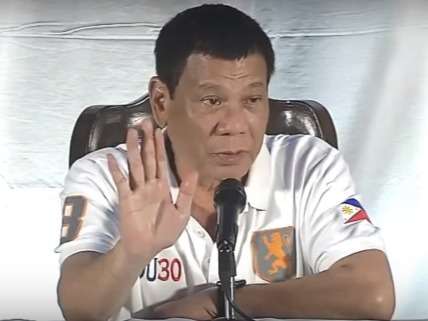Philippine President Says Trump Supports His Murderous Antidrug Campaign
The president-elect "understood the way we are handling it," says Rodrigo Duterte.

Philippine President Rodrigo Duterte claims Donald Trump endorsed his bloody war on drugs, which has killed thousands of people since Duterte took office last summer, in a telephone conversation on Saturday. Duterte's account of the call has not been confirmed by Trump's transition team, but it is both plausible and alarming.
"He was quite sensitive…to our worry about drugs," Duterte said. "He wishes me well, too, in my campaign, and he said that, well, we are doing it as a sovereign nation, the right way….He was wishing me success in my campaign against the drug problem. He understood the way we are handling it, and I said that there's nothing wrong in protecting a country. It was a bit very encouraging in the sense that I supposed that what he really wanted to say was that we would be the last to interfere in the affairs of your own country."
Given Trump's "law and order" rhetoric, admiration for strongmen, and simpleminded approach to drug policy, I have little trouble believing that he said something like that to Duterte, but I hope he did so without understanding what the latter's "campaign against the drug problem" actually entails, which is also sadly plausible given the president-elect's disdain for detailed knowledge and expert advice. But the signal of approval that Duterte perceived is disturbing in any case, since it reinforces his belief that suppressing drug use is important enough to justify indiscriminate extrajudicial killings.
Duterte, who campaigned on a promise to "kill them all" and fill Manila Bay with the bodies of criminals, does not recognize a distinction between suspects and convicts, between predatory and consensual offenses, or even between drug dealers and drug users, both of which he says should be wiped out. "These sons of whores are destroying our children," he told a crowd in a poor neighborhood of Manila after taking office. "I warn you, don't go into that, even if you're a policeman, because I will really kill you…If you know of any addicts, go ahead and kill them yourself as getting their parents to do it would be too painful." In September he likened himself to Hitler, telling reporters "there are 3 million drug addicts" in the Philippines, and "I'd be happy to slaughter them." Duterte has encouraged police to shoot first and ask questions later, promising pardons for cops accused of using excessive force against suspected drug dealers.
Duterte, like Trump, is prone to rhetorical excess, but his words have had deadly consequences. According to the Philippine National Police, more than 5,800 people have been killed in connection with Duterte's war on drugs since he took office on July 1. The government says more than 2,000 were "suspected drug personalities killed in police operations," while more than 3,800 died in "extrajudicial or vigilante-style killings."
Duterte's bloodthirsty antidrug campaign has been condemned by human rights groups, the Obama administration, the United Nations, and the European Union. He has responded with insults and death threats.
Did Trump consider all of this and nevertheless pat Duterte on the shoulder? "It sounds like Donald Trump just gave a green light to murder," says Ethan Nadelmann, executive director of the Drug Policy Alliance. "By effectively giving his blessing to Duterte's murderous campaign, the president-elect has signaled to foreign leaders his disregard for both due process of law and human rights—and raised the possibility that he might one day treat U.S. law with the same contempt."
It seems more likely that Trump is only dimly aware of what is happening in the Philippines but likes the idea of getting tough on drugs. Back in 1990, when Trump said "you have to legalize drugs to win that war," he also suggested that drug law enforcement was "a joke" because politicians "don't have any guts." More recently, he has emphasized the latter theme. "If we police properly," he said last year, "we shouldn't [legalize drugs]."
Trump's idea of proper policing sounds like a caricature of a clueless drug warrior who thinks a lack of serious effort is the only reason prohibition has been failing for more than a century. "I'm going to create borders," he promised in a campaign video. "No drugs are coming in. We're gonna build a wall. You know what I'm talking about. You have confidence in me. Believe me, I will solve the problem."
The charitable interpretation of Trump's alleged support for Duterte's homicidal drug policy is that he is not up on the details but perceives a kindred spirit in the Philippine president: a man determined to get things done no matter what his critics say. That explanation is troubling enough, since details matter and critics can be right, especially when they object to state-sanctioned murder.


Show Comments (98)